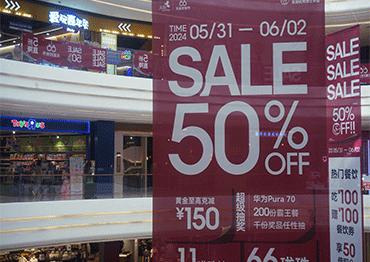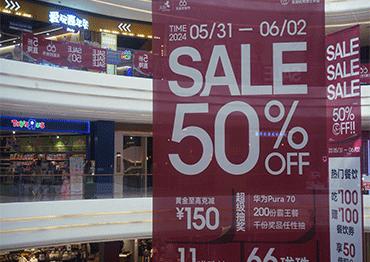Major e-commerce platforms have stopped offering advance sales ahead of shopping promotions, although experts say that in a crowded ecosystem, they should reconsider how they appeal to consumers and support retailers if they are to remain relevant

Promotional advertising in a shopping mall in Hangzhou to meet the upcoming challenges from the 618 online shopping promotion, June 2,2024 (Photo by VCG)
“In the beginning, shopping festival activities were conducted on a single day, and the huge sales volumes overwhelmed logistics systems and delivery companies nationwide,” Huang Zhi, who sells women’s clothing, told NewsChina.
The situation eased when advance sales extended the discount period to around a month, allowing for better logistics and stock ordering.
But Huang argued that the primary aim of advance sales was to sell more. She told NewsChina they usually launched two sales during a 618 shopping festival period, one between May 20 and June 1 and the other from June 2-20. “The two sales create a great atmosphere and they inspire people to buy,” she said, adding that the discounts were very big at that time.
According to Alibaba’s own data, its online sales volume hit 36.2 billion yuan (US$5b) on November 11, 2013, half the total retail nationwide consumption for the same day and twice the online sales volume on November 11, 2012.
“Our company has participated in shopping festivals since 2015. When we saw the sales volume exceed 100 million yuan (US$13.8m), we were so excited that our entire team flew from Hangzhou to our Beijing headquarters to celebrate. We even hired a dragon and lion dance team to help with the celebration,” said e-commerce seller Chen Sida.
Chen believes that advance sales played a crucial role in the development of their brand by increasing their shortterm capital and boosting future sales.
“The shopping festivals have become the most powerful means to stimulate sales, but the sudden fluctuations in sales volumes brought more uncertainties. That’s why advance sales emerged, which also helped with launching new and seasonal products,” Cui Lili, executive director of the E-commerce Institute, Shanghai University of Finance and Economics, told NewsChina.
“Ten years ago, advance sales were designed to increase certainty of customer demand and alleviate supplier pressure on inventories. This strategy has played an important role in maturing the e-commerce industry,” said an anonymous executive from Taobao Tmall Group.
Customers’ Displeasure
The rise of upstart e-commerce platforms in the last five years destabilized existing big tech platforms like Tmall and JD, with sales falling after Pinduoduo and short-video platform Douyin disrupted the market with livestream gimmicks and by undercutting prices. Meanwhile, advance sales and their complicated promotions are increasingly frustrating customers.
Gao Junqiu told NewsChina that buying during the heavily promoted shopping festivals now does not necessarily ensure the lowest price. In her experience, some headline offers are just smoke and mirrors or based on bulk buys, even for small things like napkins. Her home is too small to store large quantities of products.
A 2023 report on consumption complaints by the China Customers Association (CCA) revealed that advance sales on e-commerce platforms was the top complaint. The CCA criticized the advance sales system for being dishonest in pricing and giveaways, as well as delayed delivery.
Huang warned that suppliers suffer if there are complaints over advance buys, including customers discovering that a product they had paid for in advance was actually more expensive than it was normally, which has happened to her company.
“The same product is sold on multiple online channels at the same time, and since the suppliers have several thousand units in stock, you can get the pricing wrong. Customers are quite sensitive to prices,” she said.
Big brands are not immune from these problems. During the Double 11 promotion in 2021, consumers discovered that China’s most influential livestream seller Li Jiaqi, who was hawking a L’Oréal facemask, had charged some 100 yuan (US$14) more than L’Oréal’s own store on Tmall. But according to a L’Oréal announcement, Li should have been selling them for less.
L’Oréal later published an open apology letter to customers and promised to compensate affected customers with coupons. L’Oréal blamed the complicated promotions for the pricing crisis, as the lower price on Tmall was due to both L’Oréal and Tmall offering discount coupons to users.
“Due to imperfect supervision and some loopholes in the system, advance sales have caused an array of problems, like poor quality or fakes, delayed delivery and price traps, which really undermined customer interests,” Zhao Zhenying, a researcher at the National Engineering Laboratory for E-Commerce Technologies, told NewsChina.
Focus Shift
Huang Zhi said that sellers and suppliers have been reducing their emphasis on the 618 and Double 11 promotions.
“The [advance sales] system is bound to have some loopholes and the complicated sales increased supervision difficulties for platforms. It would be better to be simpler and more direct if stores really want to offer lower prices,” she said.
As food products need to be fresh, one food supplier who declined to reveal his name told NewsChina that not having advance sales will not affect them, nor do they rely on big annual sales promotions.
He said that suppliers now care more about daily sales and customer repurchasing rates.
Huang agrees, saying it is now much easier for stores to understand customer demands. “A simple livestreaming activity on Douyin allows us to quickly test if a product sells well or not. No need to wait for shopping festivals,” she said.
Huang said they now focus on their best sellers during sales promotions, and set a maximum discount. As they have a good understanding of likely demand, they no longer need advance sales.
As CEO Shan Min of e-commerce app Wanwuxinxuan, which sells maternity and baby products, told NewsChina, “In the past, advance sales reduced supplier risk in storage at the cost of customer experience, but now, because there is more emphasis on daily sales, suppliers no longer offer very low prices for big sales and sales volume is much easier to estimate.”
Although canceling advance sales will make the price competition more direct, Shan has shifted to ensuring his products offer a good price performance ratio – the ability of a product to deliver performance for its price.
He cited the example of an eye protection lamp which used to retail for 1,500 yuan (US$207), but after removing unneeded functions and brand premiums, the price dropped to 400 yuan (US$55).
“Customers are more rational these days, so only platforms and products that show good price performance will enjoy sales growth,” he said.
Struggling Platforms
Data from China’s Ministry of Commerce showed that in 2023, China’s online retail volume reached 15.4 trillion yuan (US$2.1t), 11 percent higher than in 2022, while the growth rate was 20 percent higher than before the pandemic.
New platforms like Douyin and Pinduoduo are more adept at leveraging new media to increase sales. All platforms will have to engage more to increase sales or be left behind, Cui Lili said.
“Because there are no more advance sales, suppliers and sellers will just have to slug it out. They’ll need a better understanding of the market, and more control over supplies and capital. The platforms will have to give bigger support in data and logistics,” Cui said.
To retain and attract more users, big platforms offer coupons and subsidies. Like with Amazon Prime, “VIP” subscribers get more discounts.
Suppliers do not necessarily welcome the low prices, even though they may help increase sales. Huang told NewsChina that because platforms offered coupons for a certain product, it creates a race to give the lowest price. This happened with trendy down jackets last winter. BSD, a leading outerwear supplier in China, had ensured that one of its jackets would be sold for minimum 2,000 yuan (US$276) through all platforms, only to find that JD offered coupons, which undercut its price.
“Big brands don’t want to keep cutting prices,” Huang said.
Zhuang Shuai, founder of Beijingbased Bailian Consulting Company, told NewsChina that many suppliers are reluctant to participate in big online sales, since they will see decreased profits from low prices and multiple sales activities disturb normal operations and put pressure on inventory. “Actually, price is always relative to quality, service, designs and cultural connotation, which customers should consider when they buy. Suppliers must strike a balance between profit, customer demands and platform requirements,” he said.
Shan Min pointed out that in the past, good marketing may help make up for a lower quality product, while now, quality, cost and efficiency have the same importance as marketing. “Platforms have to be able to distinguish good or promising brands and channel more views to them,” he said. However, platforms are still sticking to price competition, launching overcrowded promotions alongside subsidies and coupons. This year, Alibaba’s Taobao platform started a “flash price-cut” scheme on its livestream channels, offering low prices for just a short time. But customers complained of wasting too much time waiting for these deals.
“Price competition is an obstinate malady for e-commerce, as customers can freely search for and compare prices among different platforms. Competition to offer ever-lower prices brings down profits while reducing what online retailers pay platforms,” Zhao Zhenying said. “Meanwhile, when low prices can’t support good quality, it worsens the shopping experience for customers, leading them to abandon the platforms,” he added.
“The issues with traditional ecommerce platforms are not just about promotions, but rather about properly defining profitability and improving supervision and services,” Zhao said. “Canceling advance sales alone is not the solution to these problems.”

 Old Version
Old Version
